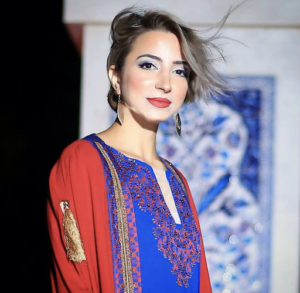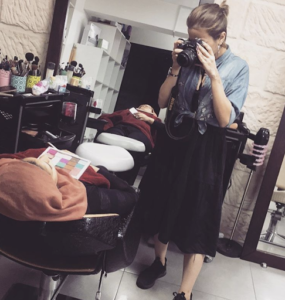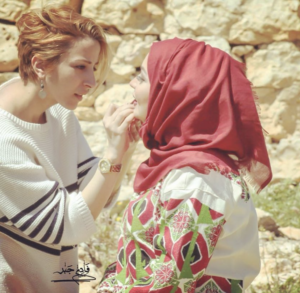BY KATIE BARNUM

Diana in 2016, shortly after launching her own business as a makeup artist.
Diana remembers the drive from Ramallah to Nablus vividly. It was her first return home after deciding to remove her hijab—a decision she had made nearly six months previously, over her family’s objection. Her palms were furiously sweating as the van traversed the West Bank’s bumpy roads. She looked out the window at the dry, rolling landscape. A drive that was only an hour in length on a good day, without being stopped at the checkpoints, felt like an eternity. Diana sat tall. Her short hair rippled in the wind from the open window. She had made this choice for herself, and she wasn’t about to turn back.
“I called my dad and told him about my decision to remove my hijab,” Diana said. “I told him, ‘I am not afraid of anyone, just my God. If you care about my hair, fine. I will cut it all.’” Diana’s logic was, “If the men consider hair as something seductive, then here it is. Gone.”
Diana left her West Bank home in her early twenties and for a time, her family cut ties with her. After a few months homeless in Ramallah, she redefined her relationship with religion, left her architecture career, and built a successful business as one of Palestine’s most famous makeup artists.
But her journey does not stop there. “I want to do more than makeup,” Diana says. “I want to help women in Palestine. We are caged here, and no one cares.” Artfully pushing the boundaries confining her, Diana has opened a space for entrepreneurial, independent, women inside Palestinian culture—defying stereotypes about women across the Middle East and Muslim world.
***
When I first met Diana, I was auditioning to be her new roommate. I planned to spend ten minutes viewing her apartment, then move along to look at another space. Instead, hours after my short tour, I found myself huddled around a tiny space heater in the middle of Diana’s living room, consumed by her energy. We sat close, under a heavy cloud of her cigarette smoke, and talked about Oprah Winfrey’s Super Soul sessions, love, and cleaning as a form of meditation.
Ever since she was young, Diana felt frustrated about constantly being controlled by men. She remembers watching her mom doing the typical duties expected of wives and mothers—cleaning, cooking, washing clothes, taking care of the children, and responding to her husband’s requests. Her mom wanted to work, but her husband told her, “No.” Diana felt like her mom was stuck, and as she grew older, Diana’s father and brothers began to confine her too. She would ask to go out with classmates, but her father would tell her “No.” While her brothers were out late at night with their friends, Diana was stuck at home. Her father said he had to “protect her virginity.” “Your brother cannot get raped, but you can,” he told her. Diana’s family and local custom both revere virginity as the determinant of a family’s value—a concept with which Diana vehemently disagrees.
“Honor isn’t at all related to virginity,” Diana says. “Honor is connected to how we are as people. It is about values, honesty, kindness. Honor is measured by who we are as humans, not by whether or not we are virgins.” Diana was angry at her lack of freedom. Others set the boundaries that determined her social life, how she dressed, what she said, and her freedom to defy rules.
“I felt resentful,” Diana said. “I hated my life and I hated myself. I felt like I had to satisfy other people. Their opinions and happiness were more important than my own. Everyone was living their life to satisfy other people and not themselves.” She decided she had enough. So, despite her fears, Diana began charting her course out of Nablus.
***
In a country with poor state infrastructure for education, and a conservative culture where more than 44 percent of females are unemployed, the cards were stacked against Diana. She graduated at the top of her university class as an architect and wanted to work in Ramallah, the center of all business in Palestine. Her family once again told her, “No.” It was not a good idea, they determined, for Diana to commute to Ramallah and work alone in a co-ed office. She went anyway. After some time, the commute got long. Traffic was always slowed down by the checkpoints—when they were open. If they were closed, Diana wouldn’t be able to make it home, and she would have to find a friend to stay with. Eventually, Diana negotiated to stay in Ramallah during the week, but she was to travel back to Nablus every weekend.
After some time, she relocated to Ramallah and lived in several apartments. In one, Diana lived with a divorced woman who was married as a second wife to a man she was cheating on with her ex-husband (whom she had previously divorced three times). In another, she lived with a religious young woman who tried to convert her to Christianity. Diana also spent two years with a group of women who didn’t approve of her transition from conservative to liberal. Then, there was a three-month period where Diana was homeless.
“I spent three months trying to find an apartment. I slept in beauty centers and salons. Sometimes I would sleep at my friend’s empty apartment when he wasn’t there, and sometimes I would sleep on my other friend’s rooftop. I didn’t want to go home because home felt like a cage, not a house.”
***
 Eventually, Diana found the apartment where she still lives. When she first started renting it, she was working long hours as an architect, but because of the financial and political constraints in Palestine, she and her colleagues would go months between paychecks. Diana couldn’t afford groceries or rent, and she had no one to turn to. Her family never visited her in her new home. When Diana’s mother came to Ramallah, she wouldn’t tell her daughter she was in town. Diana had broken the rules, and her mother couldn’t face it, so she shut Diana out. Rumors in the extended family began to spread about Diana’s life as a single, uncovered, woman living alone. A few cousins even offered to marry her out of concern.
Eventually, Diana found the apartment where she still lives. When she first started renting it, she was working long hours as an architect, but because of the financial and political constraints in Palestine, she and her colleagues would go months between paychecks. Diana couldn’t afford groceries or rent, and she had no one to turn to. Her family never visited her in her new home. When Diana’s mother came to Ramallah, she wouldn’t tell her daughter she was in town. Diana had broken the rules, and her mother couldn’t face it, so she shut Diana out. Rumors in the extended family began to spread about Diana’s life as a single, uncovered, woman living alone. A few cousins even offered to marry her out of concern.
“Shop for women at another market,” she told those relatives. Though all the slights hurt in different ways, Diana wasn’t fazed; it wasn’t in her character. She needed to figure out how to survive on her own, so she quit her job and decided to follow a passion she’d had since she was fourteen, starting her own business as a makeup artist.
“I had to hide everything from the landlord,” Diana said. At the time, she couldn’t afford to rent her own studio, so with the little money she had, Diana purchased some makeup, a chair, and ran a secret business out of her apartment. Since its beginnings, Diana’s business has grown significantly. Still operating out of her rented two-bedroom, Diana hides everything from her landlord when any repairs are needed. She now works seven days a week and has back-to-back clients. People recognize her in restaurants and on the streets. Diana even takes pride in the fact that fellow female makeup artists, who have nearly 200,000 followers on social media, try to create rumors about her, even though she only has 43,000 followers. She is seen as a threat, and she loves it. Diana says her professional peers try to destroy her image in the eyes of the public to make themselves look better. To this, she says, “good luck,” because Diana doesn’t put herself in competition with anyone. “I compete with myself,” she told me. “And that’s it. That’s the deal.”
***
 Nowadays, Diana cares about the opinions of only one group of people: her clients. She spends an incredible amount of time interacting with them, both virtually and in real life. She calls her clients and social media followers her “moons” and “beautiful girls.” Her followers often message her about makeup tips, advice for how to manage a social media page, or how to be entrepreneurs in their communities. Diana wants to help as much as she can to empower the women she meets. She communicates with the public through Instagram videos, private messages on social media, specially arranged workshops for curious learners, and dinner or coffee dates with women that want advice. Diana is committed to the women around her.
Nowadays, Diana cares about the opinions of only one group of people: her clients. She spends an incredible amount of time interacting with them, both virtually and in real life. She calls her clients and social media followers her “moons” and “beautiful girls.” Her followers often message her about makeup tips, advice for how to manage a social media page, or how to be entrepreneurs in their communities. Diana wants to help as much as she can to empower the women she meets. She communicates with the public through Instagram videos, private messages on social media, specially arranged workshops for curious learners, and dinner or coffee dates with women that want advice. Diana is committed to the women around her.
“I am trying as much as I can to empower Palestinian women,” she says. “My clients tell me that they have never had makeup [done for them] that makes them feel so beautiful. But it is not just about being beautiful, it is about making women feel welcome and supported.” Diana has run campaigns on her page specifically dedicated to women’s empowerment. One campaign featured a photo of text about celebrating women for International Women’s Day, with an image that read, “You go girl!” Underneath this image, Diana wrote, “Nothing is better than giving and empowering people, and because of that, I will support one lady and teach her all the makeup techniques, so she can have her own business.” Diana then went on to offer a free workshop for women who felt they were talented or who thought their friends were talented.
***
Diana always wears bright red lipstick and always has long, well-manicured nails, the color of which she changes weekly; her signature look to boldly match her character, after all, she has a reputation to uphold. Yet, Diana is still a free soul living in a conservative community. She feels that maybe her personality is too big for her city, or as she says, “the whole planet.” She continues to make brazen moves that challenge the traditional society around her.
Diana’s family has slowly come around to some of her new lifestyle. I once asked Diana if she ever feared her family would find out about her new liberal habits they do not—and probably will never—know about. Even in the tightly woven Palestinian culture, where word travels at the speed of sound, she remains confident in who she is. Coolly, with a deep inhale of her cigarette, Diana told me, “If they say anything about me, I’ll say something about them.”
***
I have seen Diana dance around the living room while doing stage makeup for a photoshoot, with mascara in one hand and a blending sponge in the other. I have watched her sit in silence on the balcony with her eyes closed, listening to the call to prayer, waiting for it to finish before continuing her story. Diana is both audacious and classy. She forcefully charges through the “red lines” put in front of her, yet she is incredibly nurturing and kind to the people she meets along the way. She lives her life under an identity that she has shaped for herself. Though, under it all, Diana is looking for something more. “I love what I do now, but I am looking for a new challenge,” Diana says. “I don’t know what it is, but I am trying to find it. I have the job, the money, the reputation, and I know how to crack the code, but I am looking for something that has more value; something that is more meaningful. I want to do something more for humans; more than just coloring their faces.”